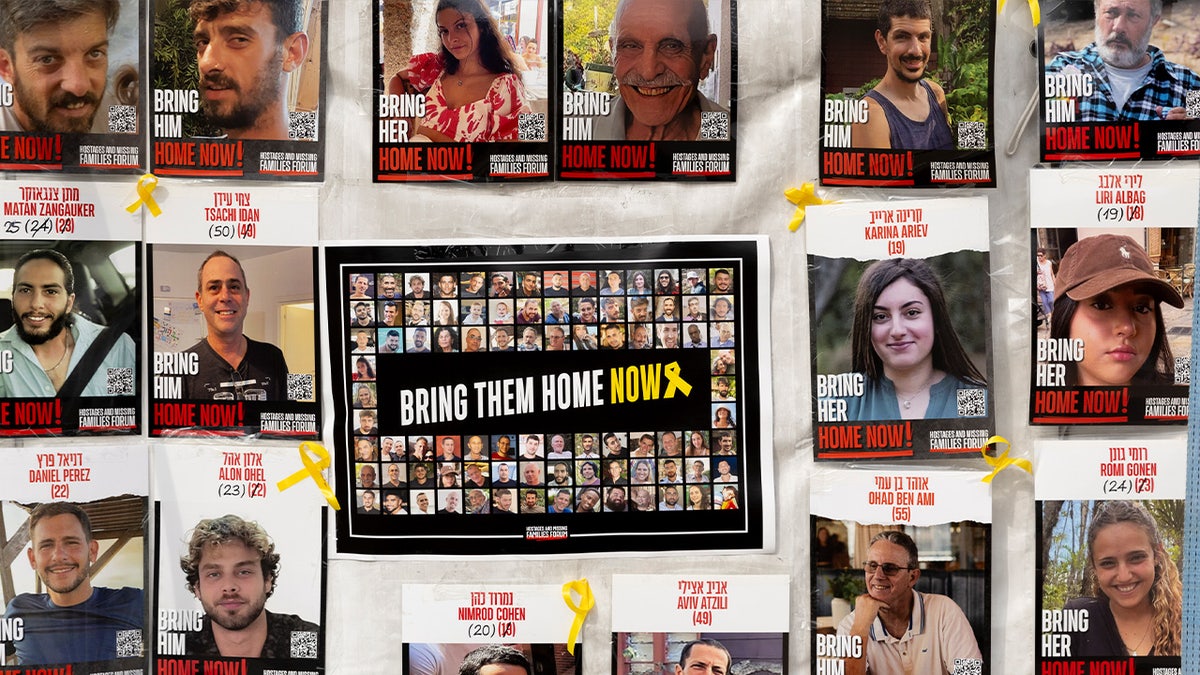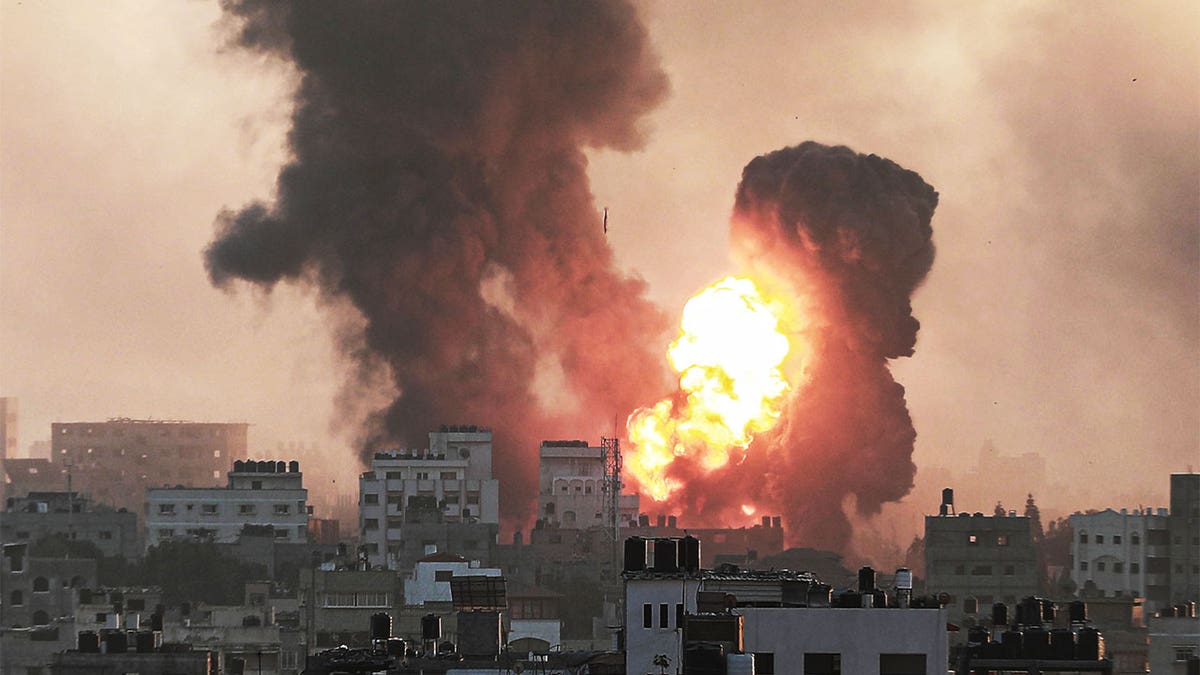News that Israel and Hamas have finally signed a deal was met with an international sigh of relief on Friday as it could mean the return of all remaining hostages who have long been held in unconscionable conditions, as well as bring an end to the brutal 15-month campaign in Gaza.
The first 42-day phase of the ceasefire and hostage-exchange agreement will begin on Sunday, when three of the 33 hostages slated to be released will be returned to Israel.
The exchange of the remaining 65 hostages, both dead and alive, will be negotiated on the 16th day of the cease-fire. However, the return of those hostages will not begin until the 43rd day of the deal, marking the second phase of the cease-fire.
Hanukkah candles are lit at places set at the festival table for the Bibas family, an Israeli family including 11-month-old baby Kfir, his four-year-old brother Ariel and their parents, Shiri and Yarden, who are being held hostage by Hamas in the Gaza Strip, in The Hostages and Missing Square, on December 9, 2023, in Tel Aviv, Israel. (Photo by David Silverman/Getty Images)
ISRAEL-HAMAS CEASE-FIRE DEAL: ISRAELI CABINET APPROVES DEAL SIGNED BY NEGOTIATORS
But the family members of hostages still in Gaza have yet to fully rejoice, and as many view the progression with cautious optimism, others believe the deal is not good enough.
“We are dealing with this deal [for] more than a year, and both sides tried to achieve the best deal for themselves,” retired Israel Defense Forces (IDF) Major General Yaakov Amidror said in a discussion with reporters Thursday afternoon.
Amidror made clear there was no way to achieve a perfect solution, given the immense complexities and the need to balance the value of human life with that of achieving a strategic security aim.
“This is the deal. It’s a bad one. But it’s the only one through which we can get out 33 hostages,” he said. “And I think that, morally, it should be done.”
Amidror pointed to the objections that have been levied against the deal by those who contend that the first phase should have included every single hostage held by Hamas, as well as by others who argue that it is bad for Israeli security.
Part of the cease-fire agreement is reported to include a plan that has Israel withdrawing its forces across the strip to a security perimeter surrounding Israeli communities on the Gaza border.

Israeli Prime Minister Benjamin Netanyahu chairs meeting as the Israeli Security Cabinet gathers to approve a cease-fire agreement and a prisoner swap deal with Hamas, in West Jerusalem on January 17, 2025. The proposed agreement, designed to end the ongoing war in Gaza, includes an exchange of hostages held by Hamas for Palestinian prisoners detained in Israeli jails. (Photo by Koby Gideon (GPO)/Handout/Anadolu via Getty Images)
Details on the IDF’s withdrawal remain unclear at this time, particularly as they relate to the phases of the agreement and specific security corridors across the Gaza Strip, though The Times of Israel reported this week that the IDF intends to remain in the Gaza Strip until the last hostage is freed.
“Israel is losing the ability to destroy Hamas totally,” Amidror said. “Israel is losing the ability to continue the momentum, and what will happen after the 42 days, no one knows.”
The retired Major General pointed out that as the terms of the deal have not been made public, it is unclear what security agreement Israel has entered into with the U.S. when it comes to Iran and the continued threat that Hamas – despite losing roughly 80% of its military capabilities with an estimated at least 20,000 militants killed – poses in potentially regrouping in Gaza.
Given these concerns, far-right Israeli National Security Minister Itamar Ben-Gvir this week reportedly threatened to quit his post if Israel were to agree to the brokered deal.
“Many people don’t like it, because it is clear that Israel is losing the ability to destroy Hamas, as we promised,” Amidror said. “But we found ourselves in a situation that is the only way to get the hostages home.”

A wall covered with photos of hostages held in the Gaza Strip after the deadly Oct. 7 Hamas attack calling for the release of the hostages on January 17, 2025, in Tel Aviv, Israel. On Wednesday, a ceasefire deal between Israel and Hamas was announced by mediators in the conflict. Formal approval from Israel’s cabinet was expected on Thursday, but delayed until Friday, although mediators insisted the deal was still expected to take effect on Sunday. (Photo by Amir Levy/Getty Images)
Amidror explained that it became undeniably evident that as soon as Israeli forces made advances in areas near where hostages were held, they were then assassinated by Hamas guards.
“We understood that there is no military way to get them. And we had to make a decision, a very tough one – do we give up the hostages [lives], or we are making a deal?”
John Hannah, former National Security Advisor to Dick Cheney and a JINSA Randi & Charles Wax Senior Fellow, said it was a “tortuous decision, enormously painful, but one that the Israeli people have to make.”
Hannah said that while the decision is “incredibly divisive,” polls show that the majority of Israelis support returning the hostages over completely destroying Hamas.
“Hamas is going to be able to claim that it survived,” Hannah said. “Israel will achieve one of its major war objectives, God willing, in the return of the hostages, but at the cost . . . [of] the annihilation of Hamas, both in its military and its governing components.”

Smoke and flames rise following an Israeli airstrike in the Gaza Strip on November 2, 2023. (Ali Jadallah/Anadolu)
CLICK HERE TO GET THE FOX NEWS APP
“The best deal is the one which was not achieved,” Amidror said. “This is the deal.”
“There is no other way to release the hostages, and from within Israeli society, that was very important,” the retired Major General said. “Israel is a democracy, the government should hear what the people say.”


